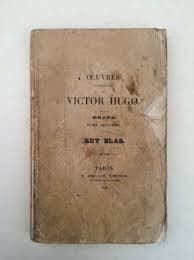As the director of the Leipzig Gewandhaus concerts, Felix Mendelssohn was approached by the local Theatrical Pension Fund to provide them, free of charge, with some incidental music for a performance of Victor Hugo’s 1838 drama Ruy Blas. Specifically, they were hoping that Mendelssohn would compose an overture and a romance for them.

Felix Mendelssohn © U.S. Public Domain
Mendelssohn got started by reading Hugo’s melodrama set at the 18th-century court of Charles III of Spain. The plot tells the sordid story of a Spanish grandee who tries to disgrace the Queen of Spain by involving her in a love affair with his valet, Ruy Blas. Disguised as a Spanish nobleman, Ruy Blas does in fact become her lover and prime minister as well. But when his master tries to blackmail the Queen into abdicating, Ruy Blas kills his master, takes poison himself, confesses his guilt to the Queen and dies with her forgiveness. Mendelssohn was incensed, and he pronounced the play “detestable and beneath contempt.” As such, he decided to forget about the overture and only provided the theater directors with a short romance, cast in the form of a little piece for chorus.
Felix Mendelssohn: Ruy Blas Overture, Op. 95 (Academy of St. Martin in the Fields Orchestra; Neville Marriner, cond.)

Victor Hugo’s Ruy Blas
After the theater committee received the little romance, they expressed their gratitude to Mendelsohn and added, “It is a great pity that you were unable to compose the overture, even though we understand that such a delicate undertaking could not be done in a hurry.” They apologized for not giving him enough time, and “hoped that next year, we might be allowed to give you a longer notice.” In fact, Mendelssohn had received the request from the Theater Pension Fund a solid eight weeks prior, and he clearly understood the sarcastic undertone of the message. “That rankled me,” he writes. “I gave it some thought that evening and began my score. Wednesday was rehearsal all morning, Thursday a concert, but I still had the overture to the copyist early on Friday, rehearsed it Monday first three times in the concert hall, then once in the theater, and then that evening the infamous piece was performed, and it was all so much more fun than I’ve ever had writing one of my pieces. At the next concert, we performed it again by request; I didn’t call it the ‘Overture to Ruy Blas,’ though, but the “Overture for the Theater Pension Fund.”
For more of the best in classical music, sign up for our E-Newsletter
